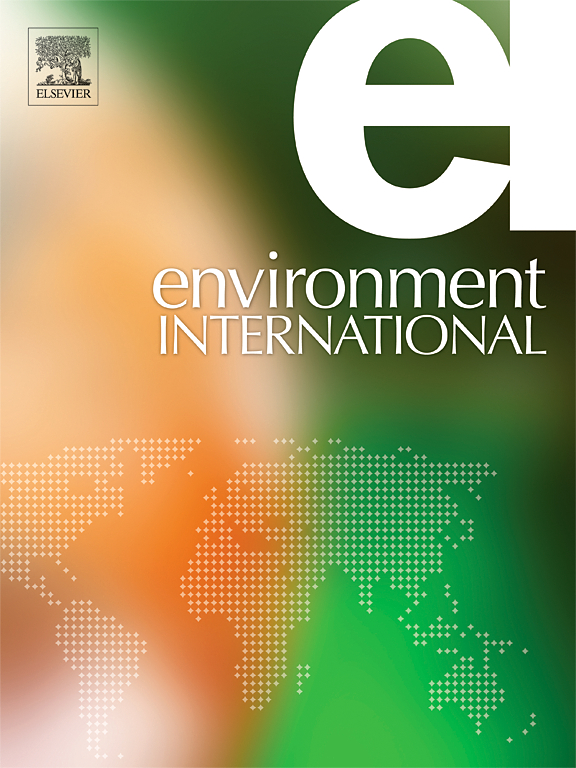Urban heat island impacts on mental health in middle-aged and older adults
IF 10.3
1区 环境科学与生态学
Q1 ENVIRONMENTAL SCIENCES
引用次数: 0
Abstract
Background
Urban heat island (UHI), attributed to rapid urbanization, might be a latent modifiable risk factor for human health, yet little is known about whether UHI puts a strain on public mental health. This study aimed to assess the effect of the summer UHI on mental health.
Methods
Leveraging 338,363 urban residents from the UK Biobank, this study estimated the associations of summer UHI effect with incidence risks of mental disorders, substance use disorder, depressive disorder, and anxiety disorder using both time-independent and time-dependent Cox regression models with full adjustment for possible confounders. Furthermore, the effect of UHI on related psychiatric symptoms and brain microstructure were explored through logistic regression models and multiple linear regression models, respectively.
Results
In this study, summer UHI was significantly associated with the elevated risks of psychiatric disorders. The hazard ratio with a 95% confidence interval (CI) from the time-dependent Cox model was 1.04 (95% CI, 1.03–1.05) for mental disorders, 1.12 (1.11–1.14) for substance use disorder, 1.08 (1.06–1.10) for depressive disorder, and 1.06 (1.04–1.08) for anxiety disorder per standard deviation of UHI intensity, respectively. Subgroup analyses showed that females and individuals with hypertension or coronary artery disease were more vulnerable to the UHI effect on mental health. The detrimental effects on psychiatric symptoms and white matter microstructure were also observed.
Conclusion
The study suggested UHI could be an environmental stressor and induce a heavier burden on mental health. The effective mitigation of urban heat stress could benefit both public health and sustainable development.
城市热岛对中老年人心理健康的影响
快速城市化导致的城市热岛(UHI)可能是人类健康的一个潜在的可改变的风险因素,但人们对城市热岛是否会给公众心理健康带来压力知之甚少。本研究旨在评估夏季全民健康保险对心理健康的影响。方法利用来自英国生物银行的338,363名城市居民,本研究使用时间独立和时间依赖的Cox回归模型,对可能的混杂因素进行了充分调整,估计了夏季UHI效应与精神障碍、物质使用障碍、抑郁症和焦虑症发病率风险的关系。此外,通过logistic回归模型和多元线性回归模型分别探讨了热岛对相关精神症状和大脑微观结构的影响。结果在本研究中,夏季UHI与精神疾病风险升高显著相关。时间相关Cox模型的95%可信区间(CI)风险比分别为:精神障碍1.04 (95% CI, 1.03-1.05)、物质使用障碍1.12(1.11-1.14)、抑郁障碍1.08(1.06 - 1.10)、焦虑障碍1.06(1.04 - 1.08)。亚组分析显示,女性和患有高血压或冠状动脉疾病的个体更容易受到UHI对心理健康的影响。对精神症状和白质微观结构的有害影响也被观察到。结论城市热岛可能是一种环境应激源,加重了心理健康负担。有效缓解城市热应激对公众健康和可持续发展都有好处。
本文章由计算机程序翻译,如有差异,请以英文原文为准。
求助全文
约1分钟内获得全文
求助全文
来源期刊

Environment International
环境科学-环境科学
CiteScore
21.90
自引率
3.40%
发文量
734
审稿时长
2.8 months
期刊介绍:
Environmental Health publishes manuscripts focusing on critical aspects of environmental and occupational medicine, including studies in toxicology and epidemiology, to illuminate the human health implications of exposure to environmental hazards. The journal adopts an open-access model and practices open peer review.
It caters to scientists and practitioners across all environmental science domains, directly or indirectly impacting human health and well-being. With a commitment to enhancing the prevention of environmentally-related health risks, Environmental Health serves as a public health journal for the community and scientists engaged in matters of public health significance concerning the environment.
 求助内容:
求助内容: 应助结果提醒方式:
应助结果提醒方式:


